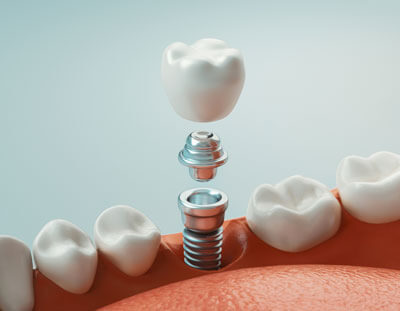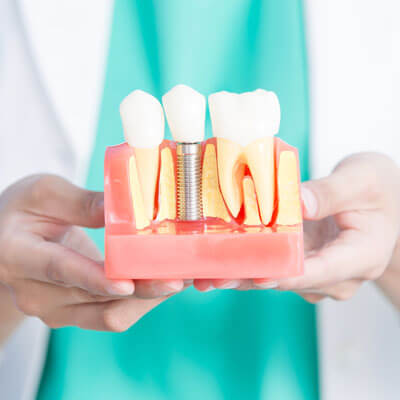Dental Implants in Applecross & Mt Pleasant
 Dental Implants are in many ways considered to be the gold-standard for replacing missing teeth.
Dental Implants are in many ways considered to be the gold-standard for replacing missing teeth.
The first dental implants were placed in 1965 by an Orthopaedic Surgeon, Professor Per-Ingvar Branemark, who famously remarked that, “‘No one should die with their teeth in a glass of water.”
In the nearly 55-years since this first implant was placed, dental implants have become an increasingly predictable, affordable and reliable method to restore missing teeth and to secure loose dentures. It has very much become an integral part of modern dentistry, and it is our goal to help our patients achieve the standard of care Prof. Branemark envisaged.
What are Dental implants?
Dental implants are small titanium screws that are placed under the gum, into the bone that supports the teeth, to take the place of missing natural tooth root. In this regard, they are essentially ‘artificial tooth roots’ that can be used to restore one or more teeth, or even a whole arch. They can also be used to help secure loose dentures, or replace dentures completely.
Originating from orthopedic surgery, dental implant technology is comparable to that used by orthopedic surgeons to replace damaged knee and hip joints.
What to Expect
No two dental implant procedures are the same, and some cases are more complex than others. This makes generalisations about implant treatment difficult, but typically implant treatment involves:
- Removal of a damaged tooth root (if it’s not already missing)
- Replacement of that root with a dental implant (sometimes carried out at the same time the natural tooth root is removed)
- A period of healing time (typically three months), during which time a temporary tooth can be worn to ‘fill the gap’ left by the natural tooth.
- It is not necessary to go without teeth during the implant-healing phase.
- Attachment of a permanent, custom-made prosthetic tooth (crown, bridge or denture) once healing is completed.
 Placement of the dental implant is a surgical procedure that requires some planning and forethought to get an ideal outcome. Typically the treating dentist will arrange for some accurate 3D X-rays and study models (plaster casts of the teeth being treated) to accurately plan the case before placing the implant.
Placement of the dental implant is a surgical procedure that requires some planning and forethought to get an ideal outcome. Typically the treating dentist will arrange for some accurate 3D X-rays and study models (plaster casts of the teeth being treated) to accurately plan the case before placing the implant.
If appropriate, the treating dentist may recommend referral to a specialist implant surgeon depending on the difficulty of the case.
The surgery itself is usually fairly minor, and in many cases can be conducted in the dental chair under local anesthetic with minimal-to-no recovery time (often using ‘keyhole’ surgery).
More complex cases may require ‘twilight sedation’ or a general anesthetic, particularly if patients are feeling a little anxious (which is understandable!).
Post-operatively for most cases there is usually minimal if any pain or downtime. However, the use of over-the-counter pain medication such as paracetamol may be recommended as a precaution.
Attaching Teeth to an Implant
Typically a single-tooth replacement that sits on top of an implant is split into two parts – an abutment and a crown. An abutment is essentially a ‘connector’ that sits on top of an implant and screwed into place. A ‘crown’ is a false tooth that is then glued (or screwed) onto the abutment to replace the missing tooth. Sometimes the abutment and crown can be fabricated as a single unit that sits into the implant and is screwed into place. The screw hole is then filled with white filling material so as to be essentially invisible.
Frequently Asked Questions
What if There Isn’t Enough Bone? Or if I Have Osteoporosis? Or I’m on Blood Thinners?
Sometimes referred to as ‘bone grafting’, these procedures may involve applying some artificial/ synthetic bone into an implant site either before or during the implant placement itself, or sometimes some of a patient’s natural bone harvested from a site near-by the proposed implant site (such as a recently removed tooth socket).
These procedures may sound quite frightening, but are typically less complex than people may think. Our dental team would be happy to explain these procedures in greater detail, and how they may relate to you.
Often patients are concerned that osteoporosis may mean they are not suitable candidates. This is not always the case. Some of the medications used to manage osteoporosis (such as Fossamax, Actonel and Prolia) may have the potential to interfere with implant healing, but a skilled surgeon will typically be able to manage this by timing the implant placement around medication cycles.
Patients on blood-thinning medication can also, generally, be successfully treated, so long as the surgeon works with a patient’s GP or treating physician to alter the blood thinning medication if required.
How Much Do Dental Implants Cost?
Our dental team would be happy to give you a fee estimate based on your personal circumstances.
Private Health insurers typically will contribute to implant treatment, and our team are well-practiced at timing the sequence of implant treatment to make the most our of your private health insurance rebates.
Our practice also offers payment plans should that be of assistance.
Why Should I Consider an Implant?
Dental implants also help ‘preserve’ the natural bone and gum that is typically lost when a tooth is extracted in a way that dentures and bridges do not.
Are Implants Right for Me?
Implants are not the best or most appropriate option for every patient. Our dental team would be happy to assist you in identifying whether you’re a good candidate for implant treatment, or whether other treatments may be more suitable for you.
Contact Us Today
Dental implants are just one of many different treatment options our experienced team can offer you, to help you achieve the treatment that’s right for you.
Contact Mount Pleasant Dental Centre today to learn more.
CONTACT US

